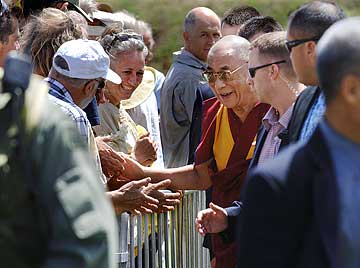
ASSOCIATED PRESS
The Dalai Lama greeted hula dancers on stage yesterday at Wailuku's War Memorial Stadium on Maui, where some 10,200 people heard his message of peace. CLICK FOR LARGE
|
|
Tenzin Gyatso, Man of Peace
About 10,200 gather in Maui to hear the Dalai Lama speak
WAILUKU » The Dalai Lama Tenzin Gyatso, the spiritual leader of Tibet in exile, delivered messages of compassion and peace on the Valley Isle yesterday.
"The most reliable source of inner strength is compassion," the Dalai Lama told about 10,200 people at the War Memorial Stadium in Wailuku, noting that by eliminating anger and frustration, people can find easier ways to face their problems.
The Dalai Lama blessed a Tibetan Buddhist stupa at the Maui Dharma Center in Paia, where more than 500 people gathered yesterday morning, then delivered a talk in the afternoon about "The Human Approach to World Peace."
Upcountry Maui resident Stephanie Matthews said she was drawn to attend the gathering because of his message of world peace. "I like to feel the presence of such a peaceful being," she said.
Along the stadium walls and backs of bleachers were hung canvasses with block prints of children's expressions of peace.

ASSOCIATED PRESS
The Dalai Lama Tenzin Gyatso greeted audience members yesterday at the War Memorial Stadium in Wailuku. The 71-year-old Nobel Peace Prize winner and spiritual leader of Tibet in exile is making his third visit to the islands and his first since 1994. CLICK FOR LARGE
|
|
Before the talk, Maui students Jessica Solomon and Roland Zaleski, who had been selected out of hundreds of student entries, read a poem and essay about peace, respectively.
The 71-year-old Tibetan praised their work.
"I'm really happy and feel a great honor," said the Dalai Lama, who received the Nobel Peace Prize in 1989. "You are the future of the world. ... Basically, it's up to you."
He spoke of the need to promote kindness and compassion, interreligious harmony and talks between the scientific and spiritual communities.
During a question-and-answer session, the Dalai Lama said he was for minorities modernizing and receiving an education while maintaining their culture, including language, their native names and history.
"Trying to preserve identity through isolation is almost suicide," he said.
He also noted his desire to bring an end to the conflict between Tibet and Communist China.
The Dalai Lama has established a home in Dharamsala, northern India, where exiled Tibetans continue to maintain their cultural heritage by operating schools that provide education for about 25,000 children, including courses in traditions, history, Buddhism and language.
In the past, the Dalai Lama -- who left Tibet in 1959 after the Chinese invasion -- has spoken about the negative effects on the Tibetan culture and ecosystem of the Chinese occupation.
More than 6,000 temples were destroyed, and an estimated 1.2 million Tibetans died, according to Tashi Wangdi, a representative of the Dalai Lama.
About 150,000 Tibetans live outside Tibet.
Tenzin Gyatso is the 14th Dalai Lama, a lineage that dates to the 15th century.
He was scheduled to deliver a talk at 2 p.m. today at the stadium on "Eight Verses for Training the Mind: A Buddhist Philosophical Discourse." Tickets are $20 each.
The Associated Press contributed to this report.

